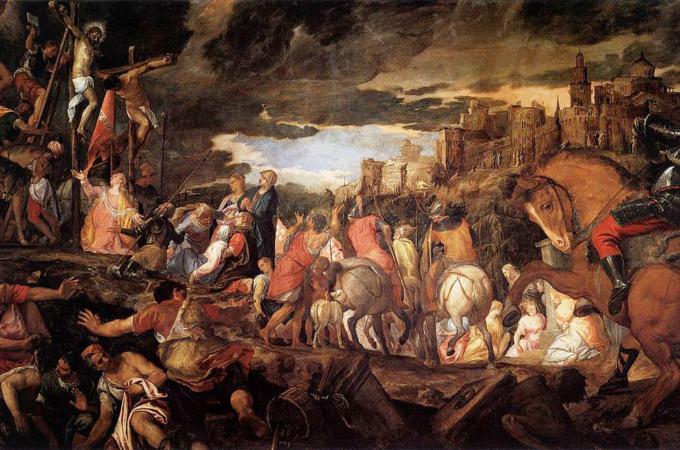Good Friday
Good Friday was bad long before it was good, at least from outward appearances. God was being crucified by all that can go bad in the world: pride, jealousy, distrust, wound, self-interest, sin. It's no accident the Gospels tell us that, as Jesus was dying, it grew dark in the middle of the day. Few images are more telling. As Jesus hung upon the cross, seemingly, light gave way to darkness, love to hatred, and life to death. How can that be good?
Moreover, as he was dying, Jesus no longer seemed divine, powerful, and in control of things, both in terms of what was happening in the world and in what was happening inside of himself. The world was sinking into distrust and, if the Gospels are to be believed, Jesus, the incarnate God, seemed to be sinking into a personal doubt, one so gripping that it triggered the words: "My God, my God, why have you forsaken me!" What's happening here? How can this be good?
To understand what happened on Good Friday we need to separate what was happening on the surface from what was happening at some deeper place.
The surface event was bad and can never by any imaginary be called good. Sincere religious people, good though weak, out of fear and weakness were selling out what was best in them and either helping incite the execution of Jesus or standing passively by and letting it happen. In effect, other than a few strong women who were not succumbing to fear or group-hysteria but who are too disempowered to practically do anything about it, everyone was aiding in the crucifixion of God, either out of ignorance, jealousy, or weakness. In Jesus' own words, darkness was having its hour. The human, social, and political drama that played out on Good Friday was not good. It showed humanity at its worst before God's seeming silence.
But there was something deeper happening on Good Friday, a drama was playing out inside the recesses of Jesus' private soul and conscience the result of which was antithetical to all that was happening on the surface, in the crowd. Inside his struggle to accept what was happening in that situation and to accept what was being asked of him, we see the ultimate moral and religious drama: love struggling with and them triumphing over hate, trust struggling with and then triumphing over paranoia, and forgiveness struggling with and then triumphing over bitterness.
We see that epic struggle, first, playing itself out in his agony in the garden of Gethsemane where Jesus literally sweats blood in the face of his options, that is, standing before every form of opposition, hatred, ignorance, and misunderstanding he must decide to either give himself over in trust or to flee in self-preservation. He chooses the former and, we are told, he is then strengthened by a divine presence.
But acceptance is not exactly full surrender and the next day, on Good Friday, the final test takes place. The angel who strengthened him in Gethsemane seems to disappear when he is on the cross and a crushing dark night of doubt now racks him to the point of making him cry out with what seemingly sounds like despair: "My God, my God, why have you forsaken me!" His acceptance, given to his Father the night before, at this crucial moment, is made infinitely more difficult by the seeming absence of his Father who had, up to now, had been his very breath. In the face of that seeming abandonment, Jesus had to make a choice for faith, love, and trust at the rawest level, in ultimate darkness. What's the choice? What does Jesus do?
In the words of Karl Rahner, Jesus lets himself "sink into the incomprehensibility of God." He surrenders to God whom he cannot at that moment feel or understand but only trust. Here's where Good Friday turns from bad to good, Jesus surrenders himself not in bitterness, grasping, or anger, but in trust, gratitude, and forgiveness. In that surrender, the struggle between good and evil, the most epic of all battles, is won.
Ultimately, all that's wrong in our world will not be vanquished by a morally superior violence, no matter how virtuous are those who are doing the vanquishing. Good violence will never rid the world of bad violence. We will rid our world of those powers that perennially crucify God only when each of us, like Jesus, can let our bitterness, grasping, and anger give way to trust, gratitude, and forgiveness. And, barring being extraordinarily gifted by special grace, we will all, like Jesus, have to let ourselves sink into the incomprehensibility of God, that is, by trusting even when we don't understand, by loving even when we are hated, and by forgiving even when we are being hurt.
All of us will have our Good Fridays, not least in our experience of death. By every appearance, they will look bad, but if we give ourselves over in trust they will be good.
- Oblate Father Ron Rolheiser, theologian, teacher, and award-winning author, is President of the Oblate School of Theology in San Antonio, TX. He can be contacted through his website www.ronrolheiser.com.
Now on Facebook www.facebook.com/ronrolheiser



















